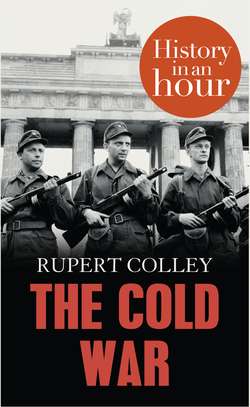Читать книгу The Cold War: History in an Hour - Rupert Colley - Страница 14
ОглавлениеStalin’s Final Years: ‘I’m finished, I don’t even trust myself’
In Russia itself, Stalin, paranoid of everyone, including his own bodyguards, unleashed a new reign of terror, as lethal as the ‘Great Terror’ of the 1930s, and, based on his fears of a Zionist conspiracy. Every Soviet citizen lived under the cloud of possible arrest and subsequent deportation or execution. Stalin’s control over his satellites remained absolute; no socialist state could make any decision or exert any form of independence from Moscow, with the exception of Tito, popular leader of communist Yugoslavia, who placed national autonomy above ideological brotherhood and who, unlike other eastern European leaders, did not need Stalin to keep him in power. Having expelled Tito from Cominform, an alliance of communist leaders set up by Moscow in 1947, Stalin considered invading Yugoslavia to teach Tito a lesson. Ultimately he decided against it.
By the end Stalin trusted no one and suspected everyone, including his personal doctors most of whom he had arrested. ‘I’m finished,’ he said in his final days. ‘I don’t even trust myself.’ With the new terror reaching fever pitch, Stalin suffered a stroke and was left to fester for several days, his personal staff too frightened to check on him. He died eventually on 5 March 1953, aged seventy-three.
Despite his tyranny, Stalin’s death was received with a public outpouring of grief. His body lay in state and such was the mass of mourners scrabbling to pay their last respects that several people died in the crush. Immediately, the Kremlin started adopting a softer approach, issuing amnesties to many languishing in Stalin’s gulags and aborting the campaign of terror. But who, after thirty years, could take the Great Leader’s place? Lavrenti Beria, Stalin’s chief of secret police since 1938, looked an obvious choice but his detractors within the Soviet hierarchy, fearful of a continuation of Stalin’s harsh rule, had Beria arrested on trumped-up charges of espionage, tried him and had him shot. A fate that Beria himself had inflicted on countless thousands of his fellow citizens. As Stalin had said, ‘No man, no problem.’ It was to be the only issue decided in blood. Nikita Khrushchev then emerged as the new leader. A Ukrainian peasant by origin, impulsive, rotund, by turn vindictive and charming, his ‘socialism with a human face’ was a different type of leadership to that of his predecessor.
